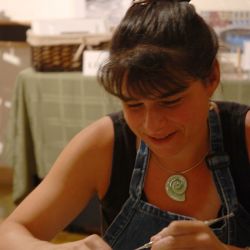Created and Sold by Lynne Meade

Leaping Fish Tile
Price $44
Creation: 3-6 weeks
Shipping: FedEx 3-5 days
Price $45 Shipping in the US, ask the creator about international shipping.
Estimated Arrival: February 7, 2025
Handmade
Woman Owned
Made In USA
Made To Order
| Dimensions | Weight |
|---|---|
18H x 6W in 45.72H x 15.24W cm | 0.45 kg 1 lb |
Art Deco, Art Nouveau, and Contemporary styled hand cut and carved porcelain tile with clear and translucent glazes. The carving is done with dental tools when the pieces are bone dry. Comes with rubber feet and a hanger on the back.
Makes a wonderful wall hanging, can be used as a trivet or can be installed in a kitchen or bathroom. These tiles also work well when combined with commercial tiles.
• Dimensions: 6" height x 6" width x 1” depth
• Material: Porcelain
• Shape: Square
• Pattern: Leaping Fish
• Designed and handcrafted in Oakland, CA.
DETAILS
Carved tiles are made-to-order.
Certain styles and colors of individual tiles are on Quick Ship.
Custom sizes and colors are available.
Commissions for different shapes and patterns are welcome.
Lead time is 3 to 6 weeks. Custom orders can take up to 8 to 12 weeks.
Makes a wonderful wall hanging, can be used as a trivet or can be installed in a kitchen or bathroom. These tiles also work well when combined with commercial tiles.
• Dimensions: 6" height x 6" width x 1” depth
• Material: Porcelain
• Shape: Square
• Pattern: Leaping Fish
• Designed and handcrafted in Oakland, CA.
DETAILS
Carved tiles are made-to-order.
Certain styles and colors of individual tiles are on Quick Ship.
Custom sizes and colors are available.
Commissions for different shapes and patterns are welcome.
Lead time is 3 to 6 weeks. Custom orders can take up to 8 to 12 weeks.
Have more questions about this item?